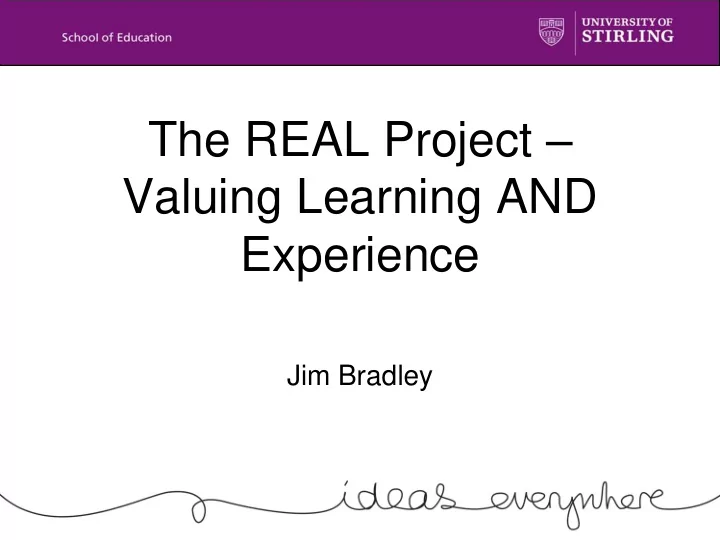

The REAL Project – Valuing Learning AND Experience Jim Bradley
• There is however no general acceptance across the international education community of RPL and in many systems RPL is used as entry level credit. Experiential learning has even less general acceptance than RPL. • • Prior learning is valued largely in terms of its similarity to pre-existing conceptions of ‘desirable’ knowledge and skill. There is no politics of difference. There is no critical epistemological or pedagogical engagement. The gatekeepers have widened the gate slightly in terms of greater flexibility regarding the site of knowledge production but care is taken not to let any actual ‘outsider knowledge’ slip through unnoticed. • (Harris, 1999, p124)
For candidates seeking recognition of prior experiential learning it is even more difficult. In this case, according to Fejes at al, the knowledge has to be made ‘visible’: - The important thing is to what you know, rather than what course you have studied, and learning from experience might not give exactly the same knowledge as learning from studying. (Andersson, 2004, p 58)
The situation in the rest of the UK is no less clear in terms of the awarding of credit for both standard and non-standard awards although the government objectives for this are clear:- Recognition of Prior Learning (RPL) is a method of assessment which considers whether a learner can demonstrate that they meet the assessment requirements for a unit through knowledge, understanding or skills that they already possess and do not need to develop through a course of learning and is distinct from credit transfer (for existing achievements within the QCF) or exemptions (for certificated achievement outside the QCF).
• The situation in the rest of the UK is no less clear in terms of the awarding of credit for both standard and non-standard awards although the government objectives for this are clear:- • • Recognition of Prior Learning (RPL) is a method of assessment which considers whether a learner can demonstrate that they meet the assessment requirements for a unit through knowledge, understanding or skills that they already possess and do not need to develop through a course of learning and is distinct from credit transfer (for existing achievements within the QCF) or exemptions (for certificated achievement outside the QCF).
Most people presently have gained ICT skills through experience rather than through a particular, formal learning programme. RPEL offers no repeat of learning and assessment; Saves time and money; may encourages take up and retention and may support progression and personalise learning. In our culture we only value what we have been taught not what we have taught ourselves Lillas, F, 2011
Our proposal will build on the success of this project and extend, adapt and develop the Flexi-Path toolkit so that it can be used by anyone who wishes to accredit their competences based on relevant experience. Using national qualification frameworks the proposed toolkit is focused on enabling learners to validate their own experience against their own national framework. In this way the proposal is aimed at managing the awarding of credit by the awarding institution in relation to lifetime knowledge and experience of the learner. This proposed method of accrediting experiential learning will start to make a change to the power relationships which favour the receiving institution and tend to work against both the applicant and the whole ethos of RPEL.
• One of the first barriers facing any project undertaken in relation to this area is that despite the EQF framework there is in reality no common use of language across adult education in the UK and across Europe. Further, the way in which the language is used can means different things to different people. Phrases such as accreditation of prior learning (APL), recognising prior learning (RPL) or valuing prior learning (VPL) are some of the terms used to describe the process of awarding credit for accredited learning that has been previously gained. Such learning is predominantly focused on factual knowledge, including theoretical understanding of practical processes but not the effective undertaking of associated tasks. As there is no set understanding of the language used for the purpose of this paper the phrases RPL (recognition of prior {accredited} learning and RPEL (the recognition of prior experiential learning) will be used .
• In Scotland, the Scottish Credit Qualifications Framework (SCQF) has been at the centre of this standardisation of credit and in the main this has most benefited those learners who are looking to use previous credit to access undergraduate or post graduate studies at universities. Some institutions play a pro- active role in awarding credit and look to create flexible learning pathways for those with prior awards. However, many other institutions are less than active in the awarding of credit and this can, and does, does hinder learner progression .
Recommend
More recommend